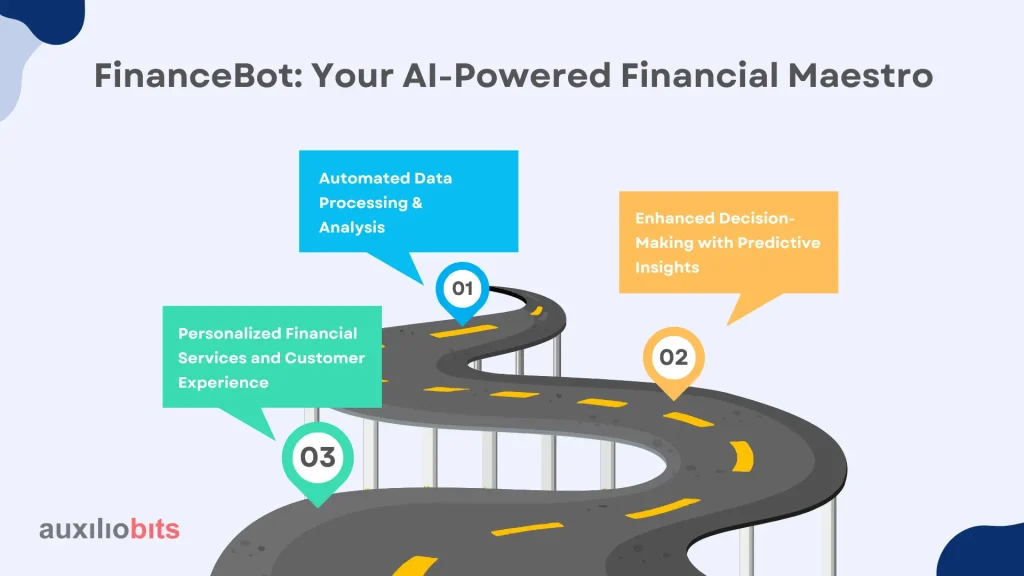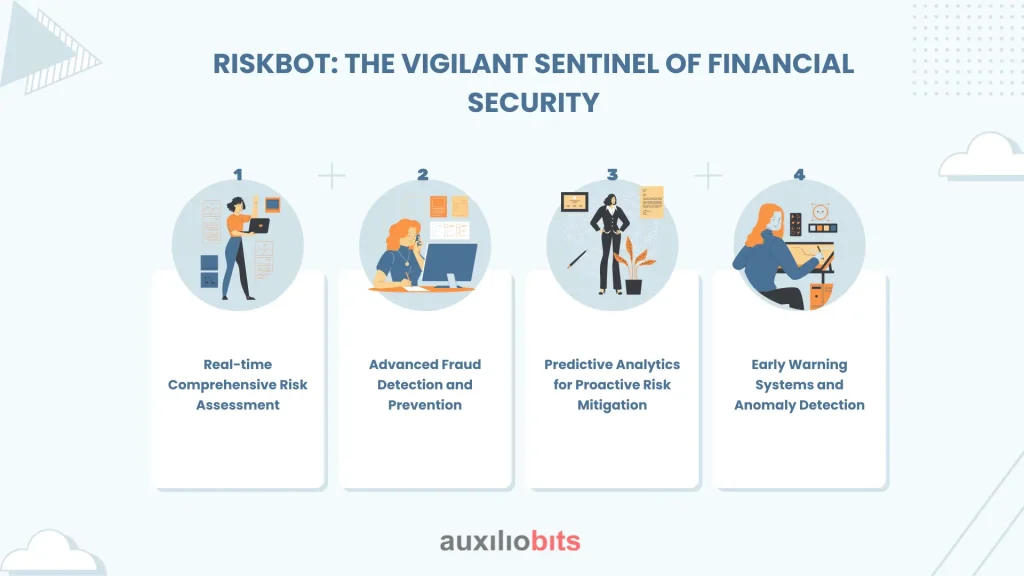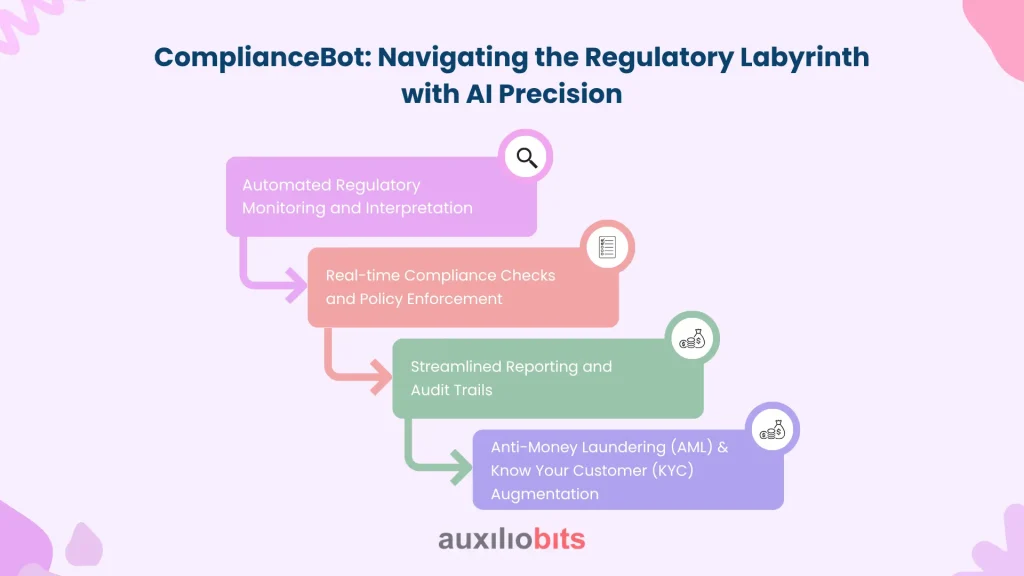
Key Takeaways
- Role-based AI agents like FinanceBot, RiskBot, and ComplianceBot are designed to excel in specific domains, offering targeted intelligence rather than generic automation.
- From forecasting cash flows to offering tailored financial advice, FinanceBots empower financial institutions to serve both internal teams and customers more effectively.
- These agents proactively monitor risk exposure, detect anomalies instantly, and enable organizations to act before small issues become major threats.
- With real-time rule tracking, automated checks, and audit-ready reporting, ComplianceBots reduce the burden of legal complexity and protect institutions from costly fines.
The real magic happens when these agents work together—FinanceBot flags an issue, RiskBot assesses it, and ComplianceBot ensures regulations are followed—creating a responsive and intelligent ecosystem.
For decades, the financial sector has been known to be the backbone of global economies. However, it has experienced severe changes over time. Strategies have now changed, and it has allowed financial institutions, investment firms, and banks to function regularly. This change is about the rise of role-specific digital systems that work like virtual assistants.
Rather than depending on one-size-fits-all tech, financial firms are now switching to digital assistants that have the skills and expertise. Every single assistant focuses on one specific area of work. Therefore, whether it is about helping employees operate without delay or identifying risk, virtual assistants are helping them avoid obstacles and work faster.
Also read: How are AI Agents Driving Business Ecosystems with Less Input?
Unpacking Role-Based AI Agents: Precision and Purpose
At its core, a role-based AI agent is an autonomous or semi-autonomous software entity engineered to execute precise functions within a predefined operational sphere. These agents leverage cutting-edge technologies, including Machine Learning (ML) for pattern recognition and prediction, Natural Language Processing (NLP) for understanding and generating human-like text, and predictive analytics for forecasting future trends.
The true innovation lies in their focused design. Instead of attempting to build a single, all-encompassing AI that might be a jack-of-all-trades but master of none, role-based agents concentrate on distinct areas.
FinanceBot: Your AI-Powered Financial Maestro
FinanceBot acts like an expert that can perform a plethora of tasks, like:

Automated Data Processing & Analysis:
Financial institutions have so much to do. Some of them are handing a lot of financial data, various reports, individual transaction histories, and more; FinanceBot helps handle all of this with ease. It automated the procedures like accounts payable and receivable, expense management, etc. They can integrate with ERP systems and accounting software, making sure that the employees get real-time updates and consistent data.
- Elaboration:
FinanceBots can identify discrepancies. In addition to this, it can see how much money has been spent, predict cash flow issues, etc. Hence, the virtual assistants help in offering actionable insights that humans would take a lot of time to learn. For example, in an investment company, a FinanceBot can analyze all the reports from several firms and generate a summary.
Enhanced Decision-Making with Predictive Insights:
FinanceBots are like the expert analysts who are available 24/7. They consider the bigger economic picture, stay ahead of the market trends, and keep a check on how a financial institution is functioning. With all this information, they allow decision-makers to understand what’s happening and what’s awaited for the future.
- Elaboration:
Let’s assume that a bank has been utilizing FinanceBot for loan underwriting. It has helped them evaluate the credit score of a customer. Apart from this, it has also made them understand if a customer has good spending habits or might end up in debt. Also, if you are someone who is working in a bank and wants to find out if a customer is getting paid by their employer regularly, FinanceBot can help you.
Personalized Financial Services and Customer Experience:
FinanceBots are digital advisors who consider your budget and help you understand your financial goals. From letting you understand if you’ll be at risk after spending a certain amount of money to help in identifying your loan eligibility, FinanceBots acts like your personal helper. It is available to help 24/7. So the next time you are concerned, FinanceBot is your safest bet.
- Elaboration:
A customer could interact with a FinanceBot via a banking app to get real-time insights into their spending categories, set savings goals, or even execute a quick fund transfer, all without needing to speak to a human representative. This improves customer satisfaction and reduces the burden on human customer service teams.
RiskBot: The Vigilant Sentinel of Financial Security
In the inherently volatile and dynamic world of finance, proactive risk management is not just an advantage—it’s an imperative. RiskBot serves as an unceasing, intelligent guardian, continuously monitoring and assessing potential threats across the institution.

Real-time Comprehensive Risk Assessment:
RiskBots are equipped to analyze vast, disparate datasets in real-time, identifying subtle anomalies and emergent risks across various critical domains. This includes credit risk (the risk of borrowers defaulting), market risk (the risk of losses due to market fluctuations), and operational risk (risks arising from internal processes, people, and systems). Their algorithms can detect intricate patterns that may signal fraudulent activities, compliance breaches, or impending market shifts.
- Elaboration:
For a large trading firm, a RiskBot can monitor market sentiment from news feeds, social media, and trading volumes in milliseconds, flagging unusual price movements or sudden drops that could indicate a flash crash or insider trading, allowing for immediate risk mitigation.
Advanced Fraud Detection and Prevention:
One of RiskBot’s most critical functions is its ability to combat financial crime. By meticulously scrutinizing transaction patterns, behavioral biometrics, and customer interaction histories, RiskBots are highly effective at identifying and preventing fraudulent activities before they can cause significant financial losses. This ranges from credit card fraud and identity theft to more sophisticated money laundering schemes.
- Elaboration:
If a customer’s spending patterns suddenly change drastically – for instance, a small-town user suddenly making large international luxury purchases – a RiskBot can flag this as suspicious, initiate a verification process, or even temporarily block the transaction, significantly reducing fraud exposure.
Predictive Analytics for Proactive Risk Mitigation:
Beyond detection, RiskBots leverage sophisticated predictive models to forecast potential future risks. This allows financial institutions to shift from reactive firefighting to proactive strategy development. For example, they can predict the likelihood of loan defaults in specific economic conditions or anticipate the impact of interest rate changes on bond portfolios, enabling timely adjustments to strategies.
- Elaboration:
In mortgage lending, a RiskBot might predict higher default rates in a particular housing market segment due to rising unemployment projections, prompting the bank to adjust its lending criteria or offer early intervention programs to at-risk borrowers.
Early Warning Systems and Anomaly Detection:
RiskBots act as highly sensitive early warning systems. They alert human risk management teams to nascent threats, providing granular details and context. This enables rapid intervention and significantly reduces the probability of a minor issue escalating into a major crisis. Their continuous monitoring means no stone is left unturned.
ComplianceBot: Navigating the Regulatory Labyrinth with AI Precision
The financial industry operates under an ever-tightening web of regulations, which are constantly evolving and subject to strict reporting requirements. ComplianceBot is purpose-built to navigate this intricate regulatory landscape with unparalleled precision and efficiency

Automated Regulatory Monitoring and Interpretation:
ComplianceBots are equipped with sophisticated Natural Language Processing (NLP) capabilities that allow them to continuously scan, interpret, and internalize new regulatory updates, laws, and policies issued by various authorities (e.g., central banks, securities commissions, data protection agencies) across different jurisdictions. This ensures the institution remains perpetually informed and compliant.
- Elaboration:
When a new data privacy regulation like GDPR or CCPA is introduced, a ComplianceBot can analyze its clauses, identify relevant internal processes that need modification, and even suggest necessary policy updates, significantly reducing the manual effort of legal and compliance teams.
Real-time Compliance Checks and Policy Enforcement:
These agents are integrated directly into operational workflows, allowing them to monitor transactions, customer onboarding processes, and internal activities in real-time. Any activity that deviates from established regulatory standards or internal policies is automatically flagged, investigated, or halted, drastically reducing the risk of non-compliance and the imposition of hefty fines.
- Elaboration
During a customer onboarding process, a ComplianceBot can instantly verify provided documents against regulatory requirements, cross-reference databases for sanctions lists, and ensure all necessary disclosures are made, making the KYC process faster and more robust.
Streamlined Reporting and Audit Trails:
ComplianceBots automate the laborious process of generating complex regulatory reports. They ensure data accuracy, consistency, and timely submission, significantly reducing manual effort, the potential for human error, and the stress associated with audit preparations. Every action taken by the bot is meticulously logged, creating an immutable audit trail.
- Elaboration:
For quarterly financial disclosures, a ComplianceBot can gather data from various internal systems, format it according to regulatory templates, and even identify potential inconsistencies before submission, ensuring complete and accurate reporting.
Anti-Money Laundering (AML) & Know Your Customer (KYC) Augmentation:
These agents are indispensable in the fight against financial crime. They play a pivotal role in AML and KYC processes by analyzing vast quantities of customer data, verifying identities, and detecting suspicious financial activities indicative of money laundering or terrorist financing. They enhance due diligence procedures by automating checks against watchlists and identifying complex transaction networks.
- Elaboration:
A ComplianceBot can analyze a customer’s transaction history, geographical patterns, and relationships to flag potential money laundering activities that might be too subtle for human detection, triggering further investigation by AML specialists.
The Synergistic Power: A Holistic Approach
The true disruptive potential of role-based AI agents is realized when they operate not in isolation, but as a cohesive, synergistic unit. Imagine a scenario:
- FinanceBot identifies an unusually large transaction from a client that deviates from their historical spending patterns.
- This anomaly is immediately flagged to RiskBot, which then conducts a deeper analysis, cross-referencing global fraud databases and behavioral analytics to determine if it’s a potential fraudulent activity or a legitimate, albeit unusual, transaction.
- Simultaneously, ComplianceBot ensures that all actions taken – from flagging the transaction to any subsequent investigations or reporting – adhere strictly to Anti-Money Laundering (AML) regulations and internal policies, automatically generating an auditable trail of the entire process.
This interconnected intelligence creates a resilient, agile, and supremely efficient ecosystem. It’s a comprehensive approach that not only enhances overall operational excellence but also proactively minimizes risks and guarantees unwavering adherence to the increasingly complex regulatory landscape.
Benefits for Financial Institutions
The strategic adoption of role-based AI agents ushers in a new era of competitive advantage for financial institutions, delivering a multitude of quantifiable benefits:
Unprecedented Efficiency and Velocity:
By automating tedious, high-volume, and data-intensive tasks, AI agents free up invaluable human capital. This allows highly skilled employees to pivot their focus from mundane data entry and reconciliation to more strategic initiatives, complex problem-solving, and high-value customer interactions.
Elevated Accuracy and Precision:
AI agents process and analyze data with a level of precision and consistency that far exceeds human capabilities. This drastically reduces the incidence of costly human errors, leading to cleaner data, more reliable reports, and fewer financial discrepancies.
Superior Risk Mitigation and Proactive Defense:
The ability to continuously monitor, analyze, and predict risks in real-time allows institutions to anticipate threats and implement preventative measures. This leads to significantly reduced financial exposure to fraud, market volatility, and operational failures.
Robust and Continuous Compliance:
With real-time monitoring and automated reporting capabilities, AI agents ensure that financial institutions maintain continuous adherence to all relevant regulations. This minimizes the risk of regulatory penalties, fines, and severe reputational damage.
Exceptional Scalability and Agility:
These intelligent systems can effortlessly handle exponential increases in data volumes and transaction loads, scaling seamlessly with the growth and evolving demands of the business without proportional increases in human resources.
Significant Cost Optimization:
The automation of manual processes, coupled with reduced errors and enhanced risk management, directly translates into substantial operational cost reductions and improved profitability for financial institutions.
Enriched Customer Experiences:
By automating routine queries and providing personalized insights, AI agents enable financial institutions to offer faster, more consistent, and highly personalized services, leading to increased customer satisfaction and loyalty.
The Inevitable Future of Finance
Role-based AI agents like FinanceBot, RiskBot, and ComplianceBot are not merely theoretical concepts or future aspirations; they are tangible, impactful realities actively reshaping the financial industry today. By strategically integrating these intelligent systems, financial institutions can unlock unprecedented levels of efficiency, fortify their defenses against evolving threats, and ensure impeccable regulatory adherence.
The future of finance is intelligent, interconnected, and highly specialized. It is a future where AI agents empower human expertise, leading to a more resilient, transparent, and innovative financial ecosystem for all.
Is your financial institution ready to embrace this new era and empower your operations with the precision and intelligence of role-based AI agents?








